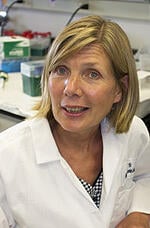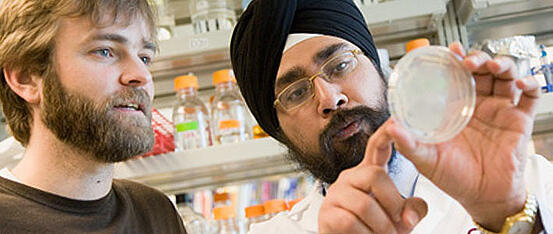 Neuroscience and genetics are two important topics life scientists are consistently studying. Researchers from UC Davis found a promising treatment for Huntington's Disease, while UC San Francisco was awarded $185 million to build a new neuroscience research institute. Recently on the East Coast, a team of researchers from the Columbia University Medical Center discovered a new neurodevelopmental syndrome as well as the genetic makeup of the mutations that cause the syndrome. (Image courtesy of Allen Ajifo via Wikimedia Commons)
Neuroscience and genetics are two important topics life scientists are consistently studying. Researchers from UC Davis found a promising treatment for Huntington's Disease, while UC San Francisco was awarded $185 million to build a new neuroscience research institute. Recently on the East Coast, a team of researchers from the Columbia University Medical Center discovered a new neurodevelopmental syndrome as well as the genetic makeup of the mutations that cause the syndrome. (Image courtesy of Allen Ajifo via Wikimedia Commons)
Tags: Northeast, Columbia University, Neuroscience, Columbia, Genetics, Neurology, NY, Columbia University Medical Center, 2016, BioResearch Product Faire, neurodevelopmental syndrome
Tags: CA, heart disease, California, genetic research, Genetics, Southwest Region, BRPF, laboratory market, 2016, BioResearch Product Faire™, Stanford, Stanford University
 Washington State University, in collaboration with a genetics testing company in India, is providing cancer patients with comprehensive testing for determining effective prostate and breast cancer treatments.
Washington State University, in collaboration with a genetics testing company in India, is providing cancer patients with comprehensive testing for determining effective prostate and breast cancer treatments.
Tags: Washington, WSU Pullman, Microbiology, WA, cancer research, WSU, Washington State University, Cancer Treatment, pharmaceutical, 2015, Biomarkers, Genetics, Northwest Region, Pullman, BioResearch Product Faire™
 In what is being hailed as a victory for both scientific research and patients' rights, the Supreme Court ruled unanimously yesterday that human genetic material cannot be patented. The case, Association for Molecular Pathology v. Myriad Genetics, has been working its way through the court system for a number of years now, led by plaintiffs including the ACLU, the American College of Medical Genetics, the American Society for Clinical Pathology, and numerous prominent genetic research scientists. The verdict invalidates the patents Myriad Genetics has held on breast cancer genes BRCA1 and BRCA2 since the 1990's and allows other labs besides theirs to test for mutations in those genes which, when present, strongly indicate a genetic predisposition to cancer. It also means that scientists can move forward in their genetic research without threat of being sued for copyright infringement. While the case was brought against Myriad specifically, the decision to disallow human gene patenting has profound implications for both scientific discovery and individual rights of ownership over our own genetic material.
In what is being hailed as a victory for both scientific research and patients' rights, the Supreme Court ruled unanimously yesterday that human genetic material cannot be patented. The case, Association for Molecular Pathology v. Myriad Genetics, has been working its way through the court system for a number of years now, led by plaintiffs including the ACLU, the American College of Medical Genetics, the American Society for Clinical Pathology, and numerous prominent genetic research scientists. The verdict invalidates the patents Myriad Genetics has held on breast cancer genes BRCA1 and BRCA2 since the 1990's and allows other labs besides theirs to test for mutations in those genes which, when present, strongly indicate a genetic predisposition to cancer. It also means that scientists can move forward in their genetic research without threat of being sued for copyright infringement. While the case was brought against Myriad specifically, the decision to disallow human gene patenting has profound implications for both scientific discovery and individual rights of ownership over our own genetic material.
Tags: 2014, CA, 2013, Bioresearch, gene patenting, cancer research, Southwest, Southwest life science marketing events, Cancer Treatment, San Diego, SDVS, Genetics, UC San Diego, biotech industry, Biotechnology Vendor Showcase
 At Georgetown University's Lombardi Comprehensive Cancer Center, researchers have announced the results of an important study showing that high levels of estrogen in the mother during pregnancy can increase a daughter's susceptibility to breast cancer later on. Specifically, the BRCA1 gene is disabled in an estrogen-rich environment, preventing it from carrying out its DNA repair tasks and leaving an opening for cancerous cells to grow. The research was presented at the 2013 American Association for Cancer Research (AACR) meeting by Dr. Leena Hilakivi-Clarke (right). The Hilakivi-Clarke Lab is on the same floor of the Research Building as that of Dr. Robert Clarke, who collaborated on the study; the Clarkes both carry out hormone-related cancer research, and Robert Clarke is the Dean for Research at the Georgetown University Medical Center (GUMC).
At Georgetown University's Lombardi Comprehensive Cancer Center, researchers have announced the results of an important study showing that high levels of estrogen in the mother during pregnancy can increase a daughter's susceptibility to breast cancer later on. Specifically, the BRCA1 gene is disabled in an estrogen-rich environment, preventing it from carrying out its DNA repair tasks and leaving an opening for cancerous cells to grow. The research was presented at the 2013 American Association for Cancer Research (AACR) meeting by Dr. Leena Hilakivi-Clarke (right). The Hilakivi-Clarke Lab is on the same floor of the Research Building as that of Dr. Robert Clarke, who collaborated on the study; the Clarkes both carry out hormone-related cancer research, and Robert Clarke is the Dean for Research at the Georgetown University Medical Center (GUMC).
Tags: 2014, 2013, Georgetown University, Washington DC, Northeast, gene patenting, cancer research, D.C., Geotwn, BioResearch Product Faire Event, Genetics, Georgetown University Medical Center
The NIH has just announced $5.3M in two new awards through the Autism Centers of Excellence (ACE) program to support autism research studies led by two University of California investigative teams, at UCLA and the UC Davis Medical Center MIND Institute. ACE funding is earmarked for large, multi-disciplinary studies into the origins of autism spectrum neurological disorders and avenues for their treatment. In the case of the two latest awardees, one is a clinical behavioral study and one is a study of genetic variants. The $5.3M is initial one-year funding, with extensions of up to five years. The ACE program includes both centers and networks. Centers are made up of multiple investigators at one site working together on a specific research problem; networks include investigative teams from different sites engaged in a focused study. Both UCLA and UC Davis are ACE centers and will lead the current research projects, though in collaboration with colleagues at other research institutions, namely Harvard, UW, Vanderbilt, Emory, Johns Hopkins, and Yale. As with all ACE research, data and findings are collected centrally by the NIH to maximize their availability to the larger research community.
Tags: 2014, CA, 2013, Southwest, Los Angeles, Autism, LAVS, UCDMC, BioResearch Product Faire Event, Funding, UCLA, Genetics, Research, Sacramento, Davis, NIH funding, UC Los Angeles, UC Davis, Biotechnology Vendor Showcase Event
 For both dairy and beef production, cows are an important part of the US economy and food supply. When they get sick, it's bad for business (and not too pleasant for the cow). The most common illness in cattle is Bovine Respiratory Disease (BRD), which accounts for losses of more than $690M annually in the US alone. To combat this threat to bovine health and productivity, the USDA has recently awarded a $9M 5-year grant to researchers at Texas A&M University's College of Veterinary Medicine and Biomedical Sciences, in collaboration with colleagues at the University of Missouri, to study genetic selection for breeding more disease-resitant stock. A second $5M grant will go towards research into feed efficiency, again with the aim of breeding heartier, healthier, and more profitable animals.
For both dairy and beef production, cows are an important part of the US economy and food supply. When they get sick, it's bad for business (and not too pleasant for the cow). The most common illness in cattle is Bovine Respiratory Disease (BRD), which accounts for losses of more than $690M annually in the US alone. To combat this threat to bovine health and productivity, the USDA has recently awarded a $9M 5-year grant to researchers at Texas A&M University's College of Veterinary Medicine and Biomedical Sciences, in collaboration with colleagues at the University of Missouri, to study genetic selection for breeding more disease-resitant stock. A second $5M grant will go towards research into feed efficiency, again with the aim of breeding heartier, healthier, and more profitable animals.
Tags: Texas A&M University, Texas, veterinary medicine, Southwest, 2012, animal science, College Station, TAMU, BioResearch Product Faire Event, Texas A&M Research, Genomics, Genetics, Texas A&M
Tags: Fred Hutchinson Cancer Research Center, Washington, AIDS Research, WA, evolution research, 2012, biology research, biology research scientists, BioResearch Product Faire Event, Genetics, Seattle
 Oregon State researchers recently discovered DNA in a nematode, a type of roundworm, that may provide an insight into the mechanisms of human aging. The researchers found a specific portion of DNA within the mitochondria of the nematode which displayed the characteristics of "selfish" DNA, in other words, DNA which actually hurts the animal's chances of survival. Scientists have previously found instances of selfish DNA occurring in plants, but this is the first example found in an animal. “We weren’t even looking for this when we found it, and at first we thought it must be a laboratory error,” said Dee Denver, Oregon State associate professor of zoology (photo left courtesy of OSU). "Selfish DNA is not supposed to be found in animals."
Oregon State researchers recently discovered DNA in a nematode, a type of roundworm, that may provide an insight into the mechanisms of human aging. The researchers found a specific portion of DNA within the mitochondria of the nematode which displayed the characteristics of "selfish" DNA, in other words, DNA which actually hurts the animal's chances of survival. Scientists have previously found instances of selfish DNA occurring in plants, but this is the first example found in an animal. “We weren’t even looking for this when we found it, and at first we thought it must be a laboratory error,” said Dee Denver, Oregon State associate professor of zoology (photo left courtesy of OSU). "Selfish DNA is not supposed to be found in animals."
Tags: Oregon State University, Aging, Northwest, cell biology, Oregon, 2012, Cell Research, Genomics, Genetics, current science events, Front Line event, OR, Corvalis, ORSTU, oregon research
The summer of 2012 is set to go down as one of the driest and worst years for US farmers, but it's proving to be an excellent season for fruit science, especially at the University of Arizona, Tucson. In June we saw the sequencing of the tomato genome (technically a fruit), which was a breakthrough in genetics research. The Arizona Genomics Institute has now cracked another complex code: the genome of the banana.
Tags: University of Arizona, DNA Sequencing, genomic research, DNA Research, genome research, banana, University of Arizona Tucson Research, Southwest, 2012, biology research, Arizona, AZ, Genetics, Front Line event, genomics research, Tucson, UA



